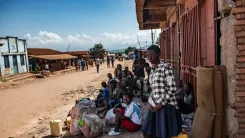Will the Dairy Plant Transform Munger's Future?

Synopsis
Key Takeaways
- Investment: Over Rs 250 crores in the dairy plant.
- Beneficiaries: Six surrounding districts will gain from the project.
- Job Creation: More than 250 direct jobs expected.
- Milk Collection: Initial capacity of 1 lakh litres daily.
- Development: A significant boost to local economies and agriculture.
Patna, Oct 27 (NationPress) Bihar Chief Minister Nitish Kumar inaugurated a series of development initiatives exceeding Rs 13,000 crore in Jamalpur, Munger, including a significant dairy processing facility earlier this month.
The expansive milk processing plant, with an estimated investment of Rs 250 crores, will positively impact six nearby districts: Bhagalpur, Banka, Khagaria, Jamui, and Lakhisarai, benefiting thousands of farmers and livestock owners.
Developed by Mother Dairy under the National Dairy Board, this plant in Jamalpur, Munger, aims to dramatically enhance milk production in the area by establishing direct connections between milk-producing villages and the processing factory.
This initiative is being celebrated by local residents as a potential game-changer, instilling hope that it will significantly improve their economic conditions.
Several locals shared their perspectives with IANS, highlighting the project’s anticipated advantages. One resident remarked, "Previously, we believed the dairy project would not materialize, but now it’s becoming a reality. With the establishment of the dairy factory in our city, Jamalpur residents will gain employment opportunities. I genuinely appreciate CM Nitish Kumar and PM Modi for this development."
Another resident noted, "This initiative is a crucial step toward the city’s development. Until now, our city has been underperforming, but this project will change our fortunes and provide jobs to many local individuals."
“This factory will benefit four districts, aiding the livelihoods of countless families,” he added.
Significantly, the dairy plant, occupying 15 acres, is projected to generate over 250 direct jobs along with numerous indirect employment opportunities. Milk collection will commence from the nearby villages.
Initially, the expected collection capacity is around 1 lakh litres daily, with plans to increase this to 2 lakh litres in the near future.










